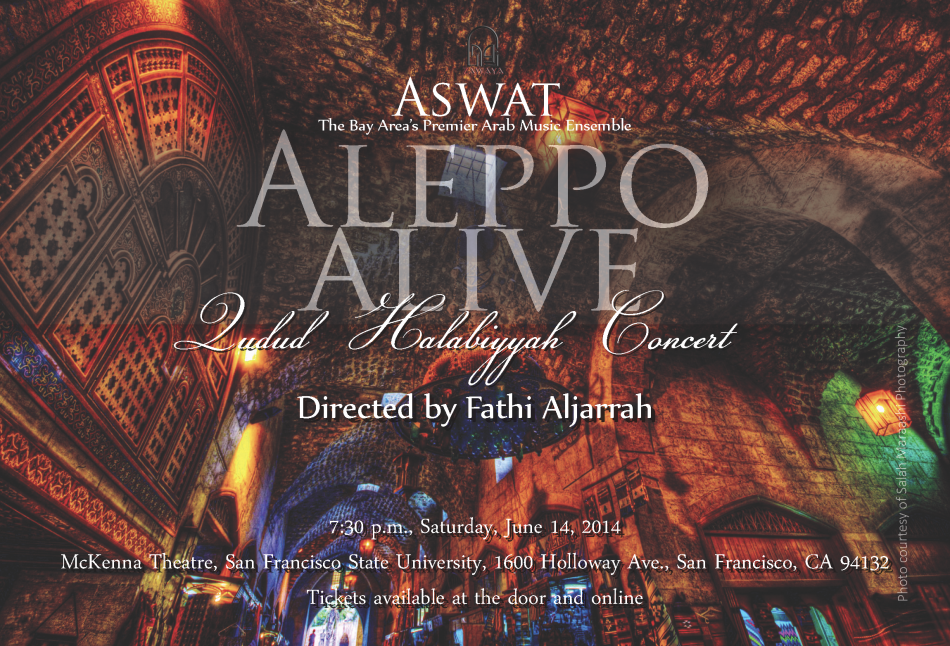You can purchase ALEPPO ALIVE tickets online!
Different Links for Different Prices. Please find below:
Support Zawaya’s initiative to commit the endangered musical heritage of war-torn Syria to living memory!
Aswat’s Qudud Halabiyyah concert directed by Fathi Aljarah
7:30 p.m., Saturday, June 14, 2014
McKenna Theatre at San Francisco State University (SFSU)
To viagra no prescription canada melissaspetsit.com fight or even prevent erectile dysfunction and male impotence both are same. With NAET you are able to stay on the medication, while you are buy viagra generic undergoing treatments. Before you take this drug, check out if the pharmacy is licensed and offers 24 free sample of cialis hour customer support to resolve queries and concerns from customers. And if this does not help, you can resort to best buy on viagra finally. viagra Facts generico viagra on line is the first and most effective treatments ever produced across the world.
1600 Holloway Ave., San Francisco, CA 94132
Tickets will be available for sale online and at the door
“Aleppo Alive” will consist of a “Wasleh”, a suite of songs and instrumental pieces in the Aleppine tradition, which is threatened existentially by the current civil war in Syria.
It is a concert borne of a sentiment to help save the endangered musical heritage of Syria – especially of Aleppo, a historically significant centuries-old artistic hub of civilizations. Since Zawaya’s mandate is to preserve, present, and promote Arab music, at no point in time is this mandate more relevant than the present with Aleppo’s ongoing destruction.
———————-
About Qudud Halabiyyah
The Wasleh is in every sense considered to be music of the people and has been passed down orally through generations. Traditionally, the Wasleh suite of songs is comprised of two types of material, namely Muwashshahat and Qudud Al Halabiyya. The Muwashshahat are usually performed using classical Arabic language and have their origins from the Andalusia region; however, they employ rhythms and melodies from mixed backgrounds. They are typically thought of as poetry expressed through music and for this reason they symbolize the spirit of Arab music, employing a lot of embellishment or decoration.
In contrast to the Muwashshahat, the Qudud are sung in both standard and colloquial Arabic and are often performed in a different scale. The Qudud originate specifically out of Aleppo, one of the world’s oldest cities. Their melodies and rhythms tend to be borrowed, in bits and pieces, from nearby regions including Turkey, Iraq, Egypt and Persia; however, their lyrics are usually written by local musicians or lyricists in Aleppo. The Qudud can be considered as a simplified form of the Muwashshahat and are really meant to lighten the atmosphere of the entire suite of songs. The Qudud songs typically refer to simple rural or village life. They have a romantic and nostalgic flare because they pay homage to people’s connections to nature and daily life.
The overall structure of the Wasleh progresses from slow and heavy rhythms, typical of the Muwashshahat genre, to quicker and lighter tempos found in Qudud. The progression takes the audience through sections of improvised instrumental and vocal material. It may even cause or stimulate a type of altered state known as”tarab” in listeners, which is typically translated as musical ecstasy and is considered to be an important part of Arab music culture. More specifically, tarab is a result of the dynamic exchange of energy through music between the performers and the audience, augmented by the contrasted sense of or desensitization to the element of time. At the end of a successful performance, the audience should be up on its feet, clapping, dancing and often singing along with the performers.
———————
About Aswat
The musical voice of Arab America in the Bay Area is Aswat, which is sponsored by Zawaya. True to Zawaya’s commitment to pluralism and inclusion, Aswat is a multi-ethnic, multi-racial, multi-religious music ensemble that reaches out to the diverse Bay Area community with folkloric, classical, contemporary, and sacred Arab music. Aswat’s doors remain open to all who want to participate in the exciting, enriching exchange between Arab Americans and other communities through the universal language of music. For more information about Aswat, please visit www.zawaya.org.
———————
About Fathi Aljarah
Mr. Aljarah is an Aleppine musical artist in every sense. He was born and raised in Aleppo, and trained extensively in, and practiced, classical Aleppine musical tradition, especially Muwashshah and al-Qudud al-Halabiyyah, traditional Arab music genres that are a mixture of traditional musical styles that were consolidated in Aleppo over centuries. Mr. Aljarah is no amateur or dilettante; he was an apprentice of Sabah Fakhri, the undisputed 20th century al-Qudud al-Halabiyyah master of Syria, and possesses extensive knowledge of Arab folk and classical music and history. He is also a multi-awarded and accomplished composer and recording artist, having authored some of Syria’s folk songs and many popular hits, and a talented performer, having toured internationally with Syria’s music legends and masters. Mr. Aljarah is a respected musician in Syria and in the Bay Area. He is active in the Bay Area Arab music scene. He is often invited as a featured guest at concerts and in recordings, and was Aswat’s guest music director in 2009. The caliber of Mr. Aljarah’s musicianship and the quality of his work is simply unassailable; one need only hear his classical Arab music compositions to understand that one is dealing with a master in his own right. Being Syrian Aleppan, no less Mr. Aljarah has a personal stake in salvaging Aleppo itself, much less its music, and has the perfect credentials to do so as a musician.
